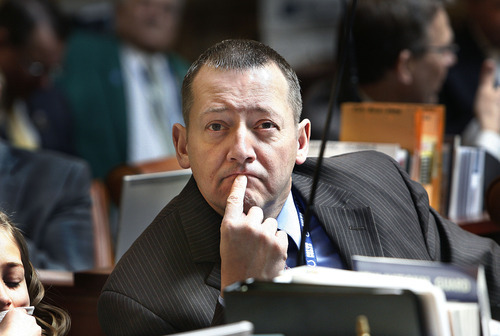This is an archived article that was published on sltrib.com in 2012, and information in the article may be outdated. It is provided only for personal research purposes and may not be reprinted.
A measure that would strip local municipalities of the ability to cite civilians with disorderly conduct charges for simply carrying a weapon openly in public passed in the House Tuesday, despite a long floor debate that stoked fears it would hamper police from suppressing potential threats.
The measure, HB49, passed 50-21.
Rep. Paul Ray, R-Clearfield, has been fighting for the bill for weeks, trying to get law enforcement to back it. But he was never able to ultimately get the Fraternal Order of Police or a majority of state police chiefs to sign off on the proposal.
"I wish I knew the real reason," Ray said on the floor when asked why police associations haven't backed it.
Kelly Atkinson, a lobbyist with the FOP, has said that his group's membership was "deeply divided" on the bill — with some saying it's a reinforcement of gun rights while others worry it will create more danger for police on the streets.
Ray has repeatedly said his bill is not an open-carry law, but instead is a bill that stops local municipalities from imposing their own restrictive gun laws that trump state law. He said local police have been using the disorderly-conduct charge as a tool for restricting gun rights.
In April, a man arrested at the University Mall in Orem was found guilty of disorderly conduct for carrying a semi-automatic weapon on him — along with a visible, holstered pistol. Philip Taylor argued he was within his rights to carry the guns, but he was fined $500 and placed on one-year probation for the offense, which was reported when an anonymous witness called police to report him.
Rep. Mikel Noel, R-Kanab, said anything that would restrict a person from having a firearm on them in an effort to protect themselves was misguided and that Ray's bill ensured Utah residents' constitutional rights.
"It actually goes back to who is responsible for your safety?" Noel said. "Who is responsible for the safety of your family? The first person that is responsible is you."
But Rep. Brian King, D-Salt Lake City, opposed the proposal — bringing up the Trolley Square massacre where an armed gunman walked into the downtown shopping mall in 2007 and killed five people before he was shot dead by police.
King said Ray's bill went too far.
"I question whether we should be putting in statute that you can open carry anywhere, anytime," King said. "I don't know if there is a need for this bill. I think this may restrict our law enforcement agencies' ability to react."
Ray said the bill didn't restrict police from questioning a person walking around with weapons — it just removed their ability to file disorderly-conduct charges because some municipalities don't like lax gun rules.
Rep. Chris Herrod, R-Provo, said he was "saddened" that the bill even had to come up, saying he was weary of the state passing laws that local governments seemed to openly disobey.
"They don't like the law and so they go around it," Herrod said.
The bill will move to the Senate where President Michael Waddoups said he expected it to get a vigorous hearing in committee, and, if it moved from there, a strong debate on the floor. Waddoups said he hadn't read the bill yet, but said there would be members in his body who would be troubled by law enforcement's chilly reception to HB49. But he also thought the Second Amendment right to carry a gun might also carry the day.
"Law enforcement wants to outgun the other side — and I understand that," Waddoups said. "But private citizens shouldn't be deprived of the right to defend themselves."
Waddoups was the original sponsor of many of Utah's concealed-weapons laws, including the 1995 statute that put the burden on government for showing why someone shouldn't be granted a concealed-carry license rather than, as had previously been the case, requiring the individual to demonstrate the need for such protection.
dmontero@sltrib.com Twitter: @davemontero —
HB49, firearms revisions
What the bill says • "The otherwise lawful possession of a firearm or other dangerous weapon, whether visible or concealed, without additional behavior and circumstances that would cause a reasonable person to believe the firearm or other dangerous weapon was carried or possessed unlawfully or with criminal intent, does not constitute" disorderly conduct.



